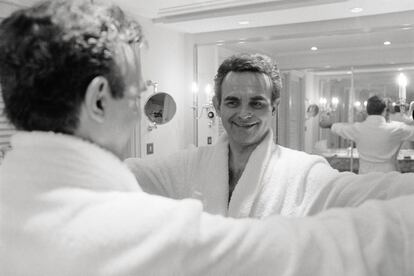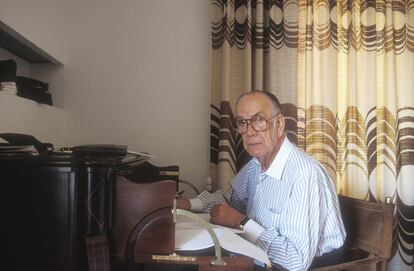After Juana Dolores’s intervention on TV3’s Mes324, many voices pointed in the same direction: if the poet and playwright’s speech was so surprising (she shook up a quiet programme with criticism and radical ideas) it was because there is usually a lack of writers on television. Writers, these voices continued, are the only ones capable of speaking in such a passionate way and, precisely for that reason, they no longer have spaces to do so. But is there really a lack of writers or intellectuals on television or was Juana Dolores’ speech surprising for other reasons?
Gone are the days when an interview with Don Camilo (José Cela) guaranteed an audience or Terenci Moix was not only another character in the social chronicle, but also presented his own spaces (such as More stars than in the skywhich was attended by figures as diverse as Gina Lollobrigida and Gonzalo Torrente Ballester). However, contemporary discussion groups are full of intellectuals, at least in the sense that Professor Stefan Collini gives to this word (“someone who has obtained recognition in a specialized field, but who goes beyond that field to speak to the public on issues of general interest”) and many of them publish books as part of their activity. Furthermore, against this cliché that usually works as a self-fulfilling prophecy and that gives up the humanities for finished, many recent essays have raised very long-term debates, going so far as to set the political agenda. Fairby Ana Iris Simon or Empty Spain, Sergio del Molino’s two decidedly literary books are good local examples of a phenomenon that has occurred worldwide with works by Michael Sandel (on meritocracy) or Thomas Piketty (on inequality). So, have literature and thought become irrelevant, or have audiences simply been transformed and segmented? Are there really figures that have become extinct or are we missing a television that never existed?
There is no need to resort to the usual examples (Umbral and his book, Cela and the basin or Arrabal and millenarianism). With less scandal, but in the midst of an equally outrageous atmosphere, one afternoon in 1986 Mercedes Milá moderated a debate that included Massiel (who improvises a speech against the bankers), Fernando García Tola (who claims to have never worked), Fernando Savater (with glasses and a shirt like an Italian singing star) and Álvaro Pombo (who immediately, as in his novels, detects metaphysical flashes in each question). Nine years ago and remembering moments like this, Fernando Sánchez Dragó in Eighty me again (TVE) commented that during that time “writers went to programs that were not specifically cultural”, and Francisco Umbral confirms it from the archive images: he emerges from a tinsel and says “writers now have to dedicate ourselves to variety shows”.
In reality, there were very few writers dedicated to “variety”: just Cela, Dragó, Umbral and Moix, each with a different way of approaching their humor. But soon, thanks to their extravagances, they managed to become figures of popular culture far beyond their books. When William Burroughs recorded an advertisement for Nike in the United States in 1994, Cela had already been starring in the company’s advertising for more than five years. Campsa Guide (yes, those ads that also feature Oteliña, the most popular driver of the nineties). Cela’s case is exceptional (like his entire career, from his offer to be an informer in 1938 to the brilliance of his works or the cynicism with which he approached so many issues) and, as far as television was concerned, it responded to a coupling from which the writer obtained a prominence and a promotion that he did not need but continued to desire and the audience, some very funny behaviors because they were unexpected in someone who had spent decades occupying a prominent place in the textbooks.
But if, beyond the four or five omnipresent authors, we have the impression that the rest of the writers also spent hours on television, it is because they frequently participated in discussions such as The keyinspired by the highly successful Apostrophes by Bernard Pivot (15 years in the prime time French) and performed at slow rhythms very different from contemporary ones (they allowed for interventions of several minutes that are currently surprising on YouTube). Also because Thoroughlywith his slow interviews lasting more than an hour, unthinkable today, has ended up forming a kind of canon that allows us to get to know authors as different as Merce Rodoreda or Juan Carlos Onetti.

Elizabeth Duval, a writer who participates in political discussions, explains that, indeed, “interventions today tend to be very brief,” so “you have to have data and think carefully about what you want to convey.” “Writing is very different because a different rhetoric of oral communication comes into play and because you have paragraphs to expand and persuade, instead of the conciseness and plain language of television, where improvisation in less than a minute is usually the best,” says the philosopher. Although her case shows that the mechanism that leads from literary success to general television continues to function, such a path is becoming increasingly rare: “What we have now is rather the opposite: commentators and presenters who publish their books seeking to sell through the media image or who win literary prizes that no longer even have literary prestige. They are no longer writers in television, but writers of “television,” explains Duval herself.
However, experts such as David Jiménez Torres, author of The ambiguous word: the idea of the intellectual in Spain (1889-2019) They warn that we should not fall into the already classic “intellectual nostalgia” or into mirages such as the idea that at some point television was full of writers debating lofty issues: “The present always seems disordered to us: we do not know which controversies or works will survive or transcend and which will disappear in the foam of the days. The nostalgia of the intellectual implies the idea that in the past there were great figures who ordered the cultural conversation while now everything is a cacophony. But we have to analyze it like any other discourse of cultural nostalgia because it is also often said that great novels were written or great films were shot before, not like now,” says Jiménez, who continues to demystify: “Another of the errors when we look at the past is that we believe that everyone read the articles of Ortega or Unamuno and it was not like that: they reached very limited audiences and they were not located throughout the country.”
Where have they gone?
Oscar Lopez directs and presents Page 2 since 2007. Although lately he has had company on La 2 (A country to read it) and will continue to have it (Electric Sheep), for many seasons has been the only programme about literature on the national grid. López believes that “television enters through the eyes and has to excite”, so he thinks that the success of his format is due “not only to what the writers tell us or what we tell about the books”, but also “to what we show of them, and that is why we love to film fragments of the novels, or that the writers go to places that have to do with the plot”. In 17 seasons, López does not remember any controversy or having had problems with the opinions expressed by any interviewee: “We do not usually enter into political considerations, but sometimes they arise and, furthermore, how many novels are not political novels too? I mean that we do not ignore these issues and even less so if the writer wants to talk about them. I only remember one problem with Michel Houellebeq, who as we well know is a very particular writer. It was something of form, not because of his opinions, but because he asked for a series of conditions to be able to film that we could not satisfy. I wanted to smoke and drink during the interview, something that is prohibited on Spanish Television, so I told him, he didn’t give in and we had to suspend it.”

One of the issues that most worries López has to do with the little time he has: “We have a half-hour programme a week and we have to select a lot, we try to balance in terms of genre and also give a lot of space to small publishers, who are doing a great job. Of course we also bring out authors who are successful and who sell a lot because there is an audience that wants to listen to them, but for us it is very important to give the opportunity to new narrative voices.” Despite his own experience, López is not too optimistic about the situation or the future of literature on television: “I no longer expect anything from private television, but the problem affects all areas. Literary journalism is experiencing a deep crisis, large supplements and magazines are also scarce, we are in that moment of transition, in a kind of limbo of passage. However, I am very encouraged by the podcasts; with them, the presence of the book in the radio field is fairly guaranteed.”
With television consumption at an all-time low (and the trend doesn’t seem likely to reverse) and a media penetration rate that declines with the age of the audience (i.e., young people are the ones who watch the least amount of television), the problem might not be so much in literature as in television itself: “Television has aged a lot and writing is fed by people younger than the median age of viewers. The literary audience is not as much there and any public agora is much more like that world of networks, podcast, “The literary world has got its act together, but sometimes I fear that the objective of literature is distorted: the most interesting thing is the books we produce, not talking about them. Sometimes I wonder if two hours are better spent reading or going to a talk at a literary festival. Just as I think that the best thing actors do is their performance in films, the best thing writers do is in their books. But all of these are promotional tools that help us to stay in the race or in that competition that we fight with other forms of entertainment for attention.”

Pérez Reverte may continue making statements that go viral every time he steps foot in the stadium. The Anthillor that Eduardo Mendoza recently attended with stupor the portable sauna of the Monaguillo in the same program. But everything seems to indicate that they are exceptions, and except for a few specialized programs, writers are not going to return to television, much less to Reality TV like those that welcomed Isabel Pisano or Lucía Etxebarría (GH VIP and Summer Camprespectively). Perhaps it was not they who abandoned the medium, nor the medium them, and it is simply the literary public that has moved to other places, such as those already mentioned. podcast or YouTube channels like those of Luna Miguel, Ernesto Castro or Jaime Bayly. Meanwhile, some presenters will continue to gain prestige by publishing books in commercial operations that do not worry true specialists in the literature industry too much. “Probably that person who buys the book of the famous presenter would not have bought any book; therefore, it does not seem negative to me. I always have the hope that, if he goes to the bookstore and buys that book, maybe he will take another one,” concludes López.
You can follow ICON on Facebook, X, Instagramor subscribe here to the Newsletter.



